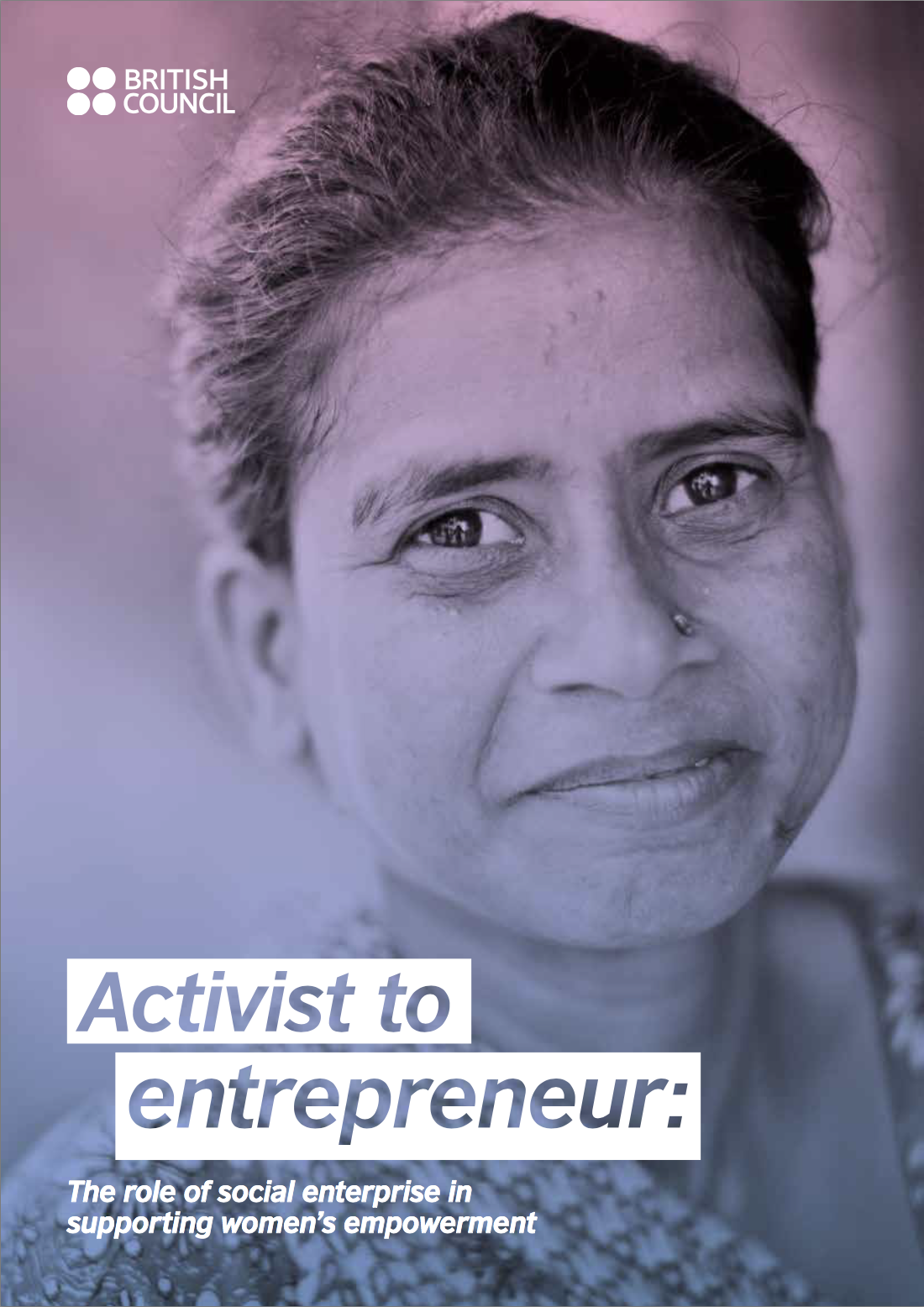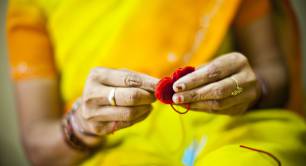Achieving gender equality through social enterprise
The British Council thinks that social enterprise has a real chance of impacting gender inequality. To find out how, read on.
If the need for gender equality was ever in doubt, the opening lines to the British Council’s new report Activist to entrepreneur: the role of social enterprise in supporting women’s empowerment makes the argument convincingly.
Globally, women and girls are at greater risk of poverty, violence and abuse than men. They are more likely to be malnourished and less likely to be educated.
They are less likely to run businesses or be in positions of leadership; and on average they earn 75 per cent less than men. Over 350 million women are still living in poverty, on less than $1.90 a day.
It seems unbelievable in this day and age doesn’t it? Around 200,000 years of human existence on this planet and this is where we are.
But the same British Council report sees a ray of sunlight amongst the gloomy statistics. It suggests that the promotion of social enterprise would be one way of empowering women and moving towards gender equality.
Paula Woodman, senior advisor in social enterprise at the British Council, first had the idea for the report three years ago. Woodman says she had been speaking at various events globally using the oft-touted statistic of women being better represented in social enterprise compared with mainstream business.
We need to understand the ways that social enterprise is or isn’t addressing gender equality
“But I’ve felt quite frustrated – it’s not enough to say that women are proportionately better represented as leaders of social enterprises than of mainstream businesses. We need to understand the narrative behind that, as well as all the other ways that social enterprise is or isn’t addressing gender equality,” Woodman says.
Mark Richardson of Social Impact Consulting, who led the research, confirms that it provided some data suggesting social enterprise still has some work to do when it comes to gender equality.
“As a sector, social enterprise reflects the gender inequalities present in the wider economy. For example, women are under-represented in positions of leadership and this is worse for larger organisations.”
But now that the report is done, Richardson is equally convinced about the potential for social enterprise to impact gender equality. He says: “Social enterprise is a really powerful force for women’s empowerment and it’s still under-utilised.
“Achieving gender equality is one of the United Nations sustainable developement goals (UNSDGs) that 193 countries, including the UK, have signed up to. If we’re to have any chance of achieving that by 2030 we need to make good use of all the tools at our disposal.”
The report considers the experience of women working in social enterprise in five countries: India, Pakistan, Brazil, the US and the UK.
With data from 1,140 responses from focus groups and surveys that took six months to process and formulate, we can now better understand how social enterprise might address UN sustainable development goal (UNSDG) number five: gender equality.
How does social enterprise help with gender equality?
The report found that social enterprise is playing a growing role in women’s empowerment through its impact on beneficiaries, entrepreneurs, employees and social norms in the following ways:
• Developing skills
• Providing employment
• Facilitating the economic empowerment of women
• Giving women a voice in their community
Perhaps surprisingly, women social entrepreneurs are not primarily driven to social enterprise in order to earn an income. For almost all of the women surveyed, the primary motivation in setting up a social enterprise was to address a social or environmental concern, or to benefit their community.
The second most popular motivating factor was the capacity for flexible working, with 25% of those surveyed identifying this. Women are still the primary carers for both children and parents and work needs to fit around these obligations.
What kind of women are social entrepreneurs?
 Given the varying kinds of social enterprise that operate in different conditions across the five countries, it’s nigh impossible to say that female social entrepreneurs fall into types.
Given the varying kinds of social enterprise that operate in different conditions across the five countries, it’s nigh impossible to say that female social entrepreneurs fall into types.
For the sake of categorisation, the report draws a distinction between formal and informal social enterprises.
The founders of formal social enterprises tend to be educated to degree level and in Brazil, India and Pakistan, are from comfortable backgrounds.
Informal social entrepreneurship at a community level is referred to as micro social entrepreneurship – very few become recognised as NGOs or social enterprises.
The report identifies that business support and funding could formalise the work the micro social entrepreneurs are doing and potentially enable them to earn an income from their work – a form of empowerment itself.
What kind of work do they do?
The report contains examples of an amazing array of different social enterprises that work in education, health, developing skills, campaigning and creating jobs.
Sometimes the work of social entrepreneurs involves tackling gender stereotypes. Both Women in Construction, a Brazilian social enterprise that trains women for work in a typically male dominated industry and Black Girls Code, which looks to get more females into STEM industries, are mentioned in the report.
Particularly interesting is the work of women’s rights organisations; many of them are using social enterprise to fund their work. Nearly one third of women’s rights organisations now list income generation as their main source of income.
What are some of the barriers to women becoming social entrepreneurs?
Barriers for women considering taking up a socially entrepreneurial activity include
- greater demands on time through home and family commitments
- less access to finance
- fewer female role models
- prejudice and discrimination
Mirroring mainstream business, female social entrepreneurs are likely to earn less than their male counterparts, as well as their for-profit peers.
Financial security is a real concern for female social entrepreneurs too, with 37% of survey respondents reporting they had experienced debt or financial insecurity as a result of starting their social enterprise (the figure was as high as 63% in Brazil).
Prejudice and discrimination was noted; 46% of women thought gender has an impact on the barriers they face in running their social enterprise.
How can we encourage the take up of social entrepreneurship by women?
Despite the advantages social enterprise can bring for women, the report makes it clear there is still much work to do.
To that end, the report also contains many recommendations for stakeholders that support the development of social enterprise. Governments are encouraged to make better provision for childcare and also to ensure social entrepreneurship can be learnt about in schools.
Someone who supports that view is Carolina Aranha, founder of Pipe Social, a web platform from Brazil that showcases social ventures with the intention of connecting them to social investors.
Brazil is a country of very different geographies – it has densely populated cities like São Paulo (where Aranha lives; it has a population of 20m) and smaller, less well connected rural communities away from the big cities.
Aranha thinks the key to promoting social entrepreneurship is education, both about social enterprise in general and the mechanisms of running a business.
“We have less than ten years of working with social entrepreneurship here. Not enough people are aware that you can start a company and, at the same time, make a better world.”
“You have to have education in order to run a company. Brazilians are very creative and flexible – they know how to adjust and adapt really fast due to the instability and political crisis that has happened here in the past. On the other hand they lack education about sophisticated financial management and ways to find and use investment.”
There’s a strong logic for the infrastructure organisations to embed a gender lens
Woodman thinks that “mainstreaming a gender lens” in social enterprise would serve to encourage more women into social enterprise. “If we recognise that women are more at risk of poverty and do face more problems in the economy, there’s a strong logic for the infrastructure organisations to embed a gender lens,” she says.
She also suggests having specific targets about the number of women reached through capacity building programmes, women receiving investment or the number of women on investment panels.
Ultimately, the point of the report is to shine a spotlight on the potential of social enterprise to achieve gender equality, explains lead researcher Richardson.
“We hope the report will stimulate a joint approach between social enterprises, women’s organisations, intermediaries, governments and funders to address these issues and really make social enterprise the beacon for women’s empowerment it can and should be.”
With only 13 years before we reach the UNSDGs target date of 2030, we hope all of those stakeholders absorb the recommendations and are moved to act in haste.
Photo credit: Emily Roetzel




 Pioneers Post is working in partnership with the British Council to bring you insights and inspiration about social enterprise in action across the world through the Global Perspectives Collection.
Pioneers Post is working in partnership with the British Council to bring you insights and inspiration about social enterprise in action across the world through the Global Perspectives Collection. 